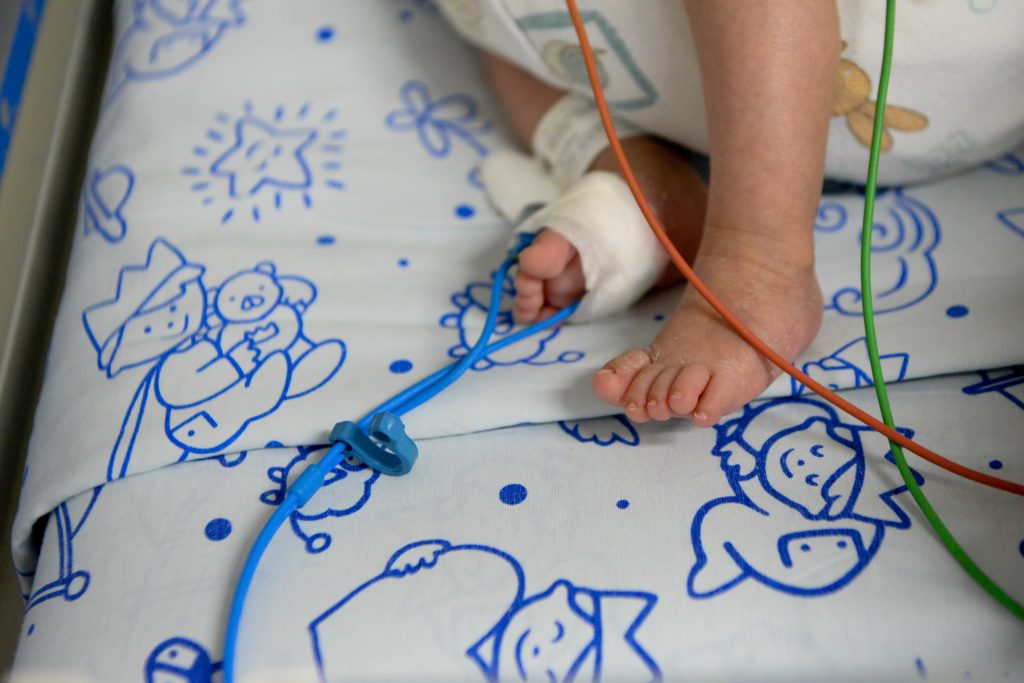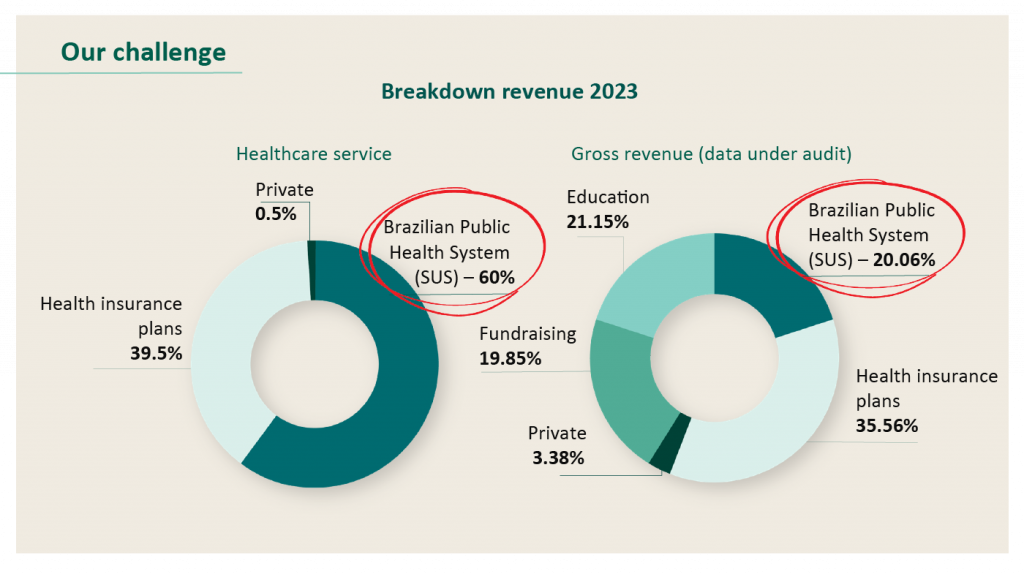Service provided by the Brazilian Public Health System generates financial deficit of 43% in Pequeno Príncipe
Survey shows that, for every US$ 20 spent on caring for these patients in 2023, the institution received US$ 11.38
Pequeno Príncipe Hospital dedicates a large part of its capacity to care for patients covered by the Brazilian Public Health System (SUS, in Portuguese). As a philanthropic institution since its foundation in 1919, Pequeno Príncipe goes to great lengths to offer the best assistance possible for all children, regardless of their socioeconomic status. The option for this type of care, therefore, is an institutional choice based on compassion and the belief that all children have the right to qualified care, which allows them to have quality of life and health to develop fully. However, this service generates many challenges from a financial point of view, as SUS remuneration values are quite out of date. In 2023, for every US$ 20 spent on Brazilian Public Health System patients, the Hospital received US$ 11.38, which represents a shortage of 43%.

For a consultation with a specialized doctor, for example, the SUS fee table provides for payment of US$ 2. For an electrocardiogram, the fee table value is US$ 1.03, and for a head tomography the expected remuneration is US$ 19.49. The prices are very different from those charged in private pediatric hospitals, where a consultation with a specialized professional can cost up to US$ 120, and a head tomography, around US$ 190.
In addition to the lack of adjustment, the SUS fee table was created based on medicine practiced in the 1980s, when this public policy was designed. Even though new medications and procedures are added to the SUS list every year, the pace of these updates does not keep up with the evolution of medicine, which is increasingly precise, but more expensive. One example is the exome sequencing, one of the most complete genetic tests available today, fundamental for defining some diagnoses of rare diseases and types of cancer. The exome has been on the SUS list since 2019, but there is still no value assigned, that is, in practice, payment for it does not occur.
This lag in the composition and values of the Brazilian Public Health System fee table – added to the rise in healthcare costs in the post-pandemic period and the crisis in the supplementary system (health plans), which has increased the number of disallowances (billings not received or declined) and extended the payment time to service-providing hospitals – intensified Pequeno Príncipe’s financial challenge. The assistance shortage in 2023 was approximately US$ 14.2 million.
To face these challenges, the institution counts on the fundamental support of society. In 2023, for example, the use of raised resources represented around 20% of total revenue, minimizing negative performance. See, in the graphs below, the composition of revenues versus services provided by the Hospital.

A story of overcoming
On April 3, 2023, Pequeno Príncipe received a 25-day-old patient, referred by a municipality in the North of Brazil. The case was urgent and critical, as the baby was born with several malformations, including myelomeningocele, hydrocephalus and omphalocele (defect in the formation of the abdominal wall, which leaves the intestine exposed). The condition was further worsened by heart problems, changes in the adrenal glands and hip dislocation.
A complete, multidisciplinary team was needed to help the baby survive. At Pequeno Príncipe, he was assisted by an intensive care physician, pediatrician, cardiologist, endocrinologist, urologist, nephrologist, orthopedist, geneticist, pediatric surgeon, neurosurgeon, neurologist, gastroenterologist, nutritionist, hepatologist, ophthalmologist, palliative care specialist, and a speech therapy, physical therapy and nursing team.
During the hospitalization period, he underwent three surgical procedures, two of them highly complex to correct the malformations, in addition to undergoing various X-rays, ultrasound, echocardiography, encephalogram, magnetic resonance imaging, tomography, cologram, genetic karyotype and exome tests, and many laboratory tests. He was administered several types of antibiotics and sedatives to help control pain, among other classes of medications, necessary for clinical stability.
It all took a total of 209 days stay period in the Neonatal and the Surgical ICUs and another ten in the ward. The child was finally discharged on December 26th, and the family was able to take their baby home – a true Christmas gift.
“For us, it is a great joy to return children to their families, in the best possible condition, guaranteeing quality of life. This motivates us. But we need the support of society to keep this type of service viable,” reinforces the CEO of Pequeno Príncipe Complex, José Álvaro da Silva Carneiro. For all this treatment, which involved almost seven months of ICU stay, Pequeno Príncipe received around US$ 11,200 from the Brazilian Public Health System, which is equivalent to US$ 54 per day. In philanthropic and private hospitals, the cost of a daily ICU stay varies from US$ 800 to US$ 2,400, which means a total treatment value of US$ 160,000 to US$ 240,000.
More
In 2023, Pequeno Príncipe assisted 745 children and adolescents who were victims of violence
In the last two decades, from 2003 to 2023, more than 9,000 boys and girls were treated; sexual violence predominates among healthcare service
Donors can leave assets to Pequeno Príncipe by means of their last will and testament
This is yet another way to contribute to the cause of children’s health, supporting the right to life of boys and girls across Brazil








